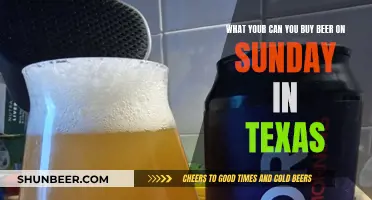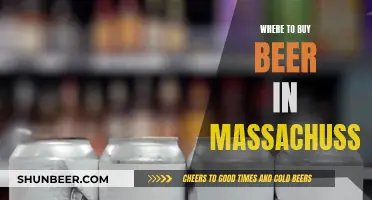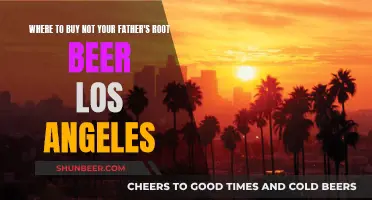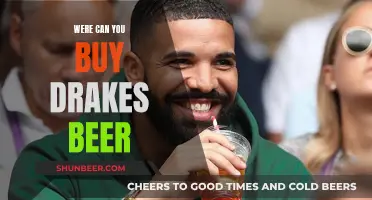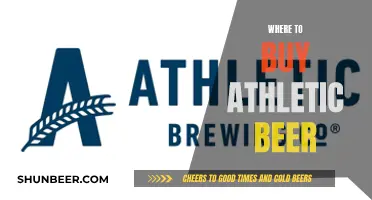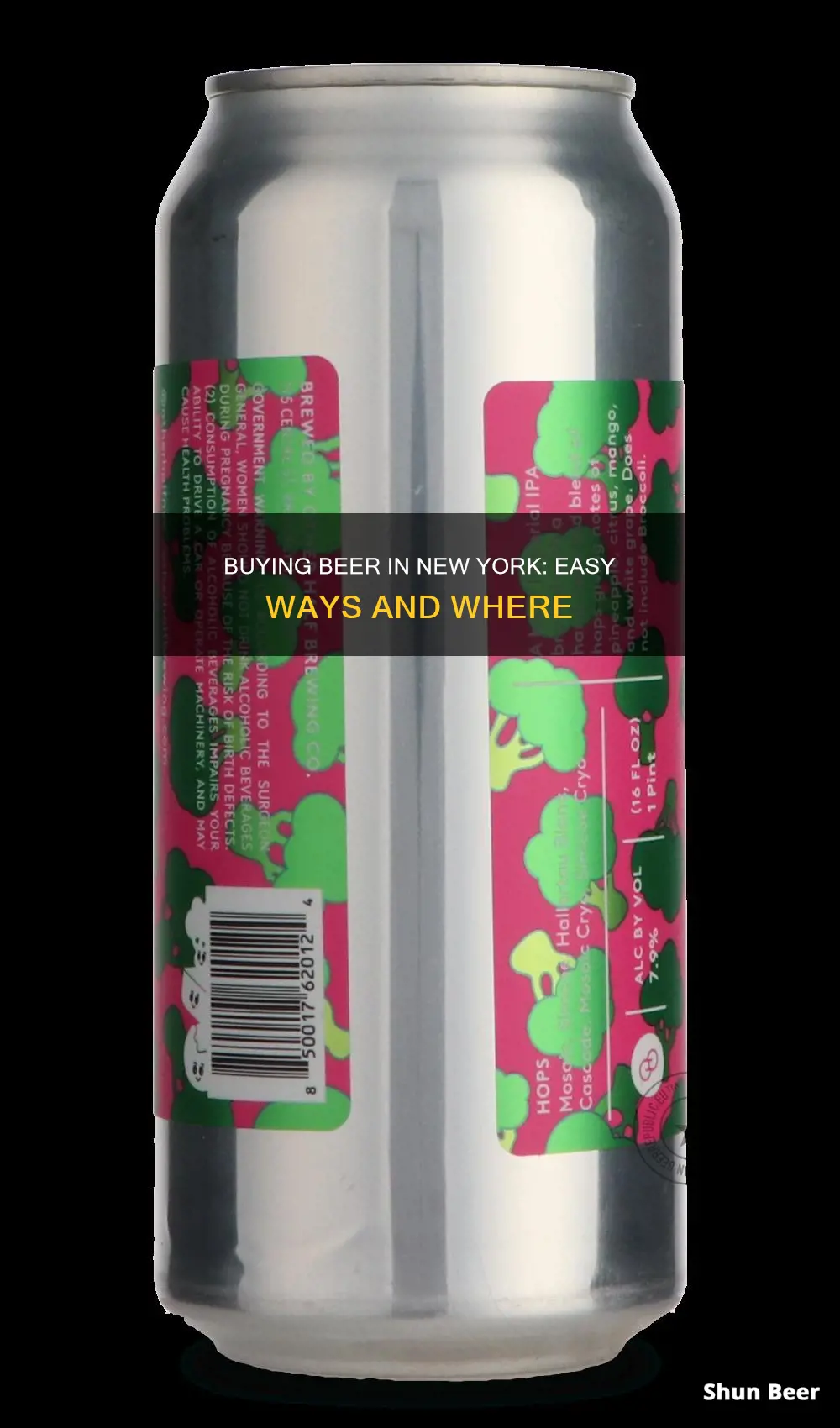
In New York, beer can be purchased in grocery stores, drug stores, and convenience stores. However, the specific rules and restrictions for purchasing alcohol vary by location and day of the week. For example, in New York County, beer can be sold for off-premises consumption during all open hours on weekdays, but liquor and wine sales are restricted to specific hours. Additionally, there are requirements for purchasing alcohol to-go, such as buying food items as well.
What You'll Learn

Beer can be bought in grocery stores and drug stores
In New York, alcohol laws are set by the New York State Liquor Authority (NYSLA) and its agency arm, the Division of Alcoholic Beverage Control (DABC). These laws cover the manufacturing, purchasing, serving, selling, and consuming of alcohol in the state. They determine the legal drinking age, driving under the influence limit, liquor license requirements, and more.
The NYSLA and DABC were established in 1934 to "regulate and control the manufacture and distribution within the state of alcoholic beverages for the purpose of fostering and promoting temperance in their consumption and respect for and obedience to law." The laws they enforce allow grocery and drug stores to sell beer, but only liquor stores may obtain a license to sell liquor for off-premises consumption.
In addition to grocery and drug stores, beer can also be purchased from bars and restaurants, package and liquor stores, and breweries and taprooms. Each of these locations has its own rules regarding the type of alcohol they can sell and the hours during which they can sell it. For example, bars and restaurants can sell beer from 8 a.m. to 4 a.m. Monday through Saturday, and from 10 a.m. to 4 a.m. on Sundays.
It's important to note that while New York State does not have any dry counties, there are some dry towns where the sale of alcohol is not permitted. These towns include Caneadea, Clymer, Lapeer, Orwell, Fremont, Jasper, and Berkshire. Other towns may also have partial restrictions on alcohol sales, such as allowing only off-premises consumption or limiting the types of alcohol that can be sold.
Yuengling Beer: Available in Wisconsin?
You may want to see also

Wine and hard liquor sales are restricted to liquor stores
In New York, wine and hard liquor sales are restricted to liquor stores. Grocery and drug stores may obtain a license to sell beer, or beer and "wine products" such as wine coolers, but not wine or hard liquor. This restriction was put in place to prevent chain liquor stores from operating in the state.
The New York State Liquor Authority (NYSLA) and its agency arm, the Division of Alcoholic Beverage Control (DABC), were established under New York State Law in 1934 to "regulate and control the manufacture and distribution within the state of alcoholic beverages for the purpose of fostering and promoting temperance in their consumption and respect for and obedience to law." The NYSLA is also authorised to determine whether the issuance of licenses to sell alcohol will promote "public convenience and advantage".
In recent years, there have been efforts to allow wine sales in grocery stores, as is the case in 40 other states. Supporters of this change argue that it would be more convenient for consumers and that it would increase the state's excise tax revenue. However, liquor store owners have fiercely opposed this idea, saying that it would put many small businesses out of work and cost the state thousands of jobs.
In 2022, liquor stores were allowed to open on Christmas, and they may now also operate on Sundays, although not before noon.
Friends, Beers, and Baseball: Can They Mix?
You may want to see also

Bars and restaurants can serve alcohol from 8 am to 4 am Monday to Saturday
In New York, bars and restaurants can serve alcohol from 8 am to 4 am Monday to Saturday. This means that the last call for alcohol orders in bars and restaurants falls at 4 am, with a hard close at 4:30 am. However, it's important to note that individual counties can set an earlier "last call". For example, in Binghamton, the last call is at 3 am, while in Syracuse, Plattsburgh, Oneonta, Rochester, and Watertown, bars close at 2 am. Elmira, Geneva, and Ithaca have some of the earliest closing times in the state, with bars closing at 1 am.
These laws were designed to accommodate both New York City's vibrant nightlife and the needs of late-night workers across the state. While there are only four hours during which alcohol may not be served from Monday through Saturday (4 am to 8 am), the limitation extends to six hours on Sundays (4 am to 10 am). This extended limitation on Sundays applies to New York County, which includes Manhattan, the Bronx, and a small portion of Queens.
It's worth noting that the rules for serving alcohol in bars and restaurants differ from those for liquor and wine stores. These stores are allowed to sell alcohol from 8 am to 12 am on weekdays and 10 am to 10 pm on Sundays. Additionally, grocery and convenience stores can sell beer for off-premises consumption 24 hours a day on weekdays, with normal hours on Christmas Day.
Buying Beer in El Dorado, Arkansas: What You Need to Know
You may want to see also

The minimum drinking age in New York is 21
The drinking age in New York has changed several times over the years. When saloons were popular spots for men to gather, gamble, and drink, the drinking age was 16. The Raines Law of 1896 was enacted to regulate these businesses, and one of the regulations raised the drinking age to 18. In 1933, with the ratification of the 21st Amendment and the end of Prohibition, states had the freedom to set their own drinking age, and New York chose 21. In 1971, after the 26th Amendment lowered the voting age from 21 to 18, New York also lowered its drinking age to 18. In 1982, the drinking age was raised to 19 due to a high number of state driving fatalities. Finally, in 1984, the New York Legislature raised the drinking age to 21 in response to the National Minimum Drinking Age Act, which reduced federal highway funding for any state that did not have a minimum purchasing age of 21.
The law in New York prohibits persons under 21 from purchasing or possessing alcohol with the intent to consume, unless the alcohol was given to them by their parent or legal guardian. There is no law, however, prohibiting persons under 21 from consuming alcohol that was given to them by their parent or guardian.
The minimum drinking age of 21 is strictly enforced in licensed restaurants and bars, with potential repercussions for the business and staff if they are caught serving minors. However, some people have reported that their underage relatives were able to drink alcohol in restaurants without being asked for ID, especially in non-chain and more expensive restaurants.
Rainier Beer: Is It Available in Wyoming?
You may want to see also

It is illegal for those under 21 to buy or attempt to buy alcohol
In New York, it is illegal for those under 21 to buy or attempt to buy alcohol. This law applies to both on-premises and off-premises consumption.
For on-premises consumption, the law is very clear. It is illegal for those under 21 to purchase alcohol in bars, restaurants, and other licensed establishments. This includes New York City, where the nightlife is renowned and closing times are some of the latest in the state. Even if a parent or guardian is present and purchasing the alcohol, it is still illegal for those under 21 to consume alcohol in licensed premises.
For off-premises consumption, the law is similar. It is illegal for those under 21 to purchase alcohol from grocery and convenience stores, as well as liquor stores. Minors visiting a liquor store must be accompanied by an adult at all times. However, there is an exception for off-premises consumption where alcohol is purchased and consumed in a private place, such as a hotel room. In this case, it is legal for parents or guardians to provide alcohol to their underage children.
The legal drinking age in New York was raised from 19 to 21 in 1985, in response to the National Minimum Drinking Age Act. This law is strictly enforced, and businesses can lose their liquor license for selling alcohol to minors. As a result, many establishments will card anyone who looks under 21, and some card all customers, regardless of their apparent age.
It is important to note that New York's Alcoholic Beverage Control Law governs a wide range of alcohol-related regulations, including commerce and public safety. These laws are designed to protect residents and businesses while promoting growth and innovation. Understanding these laws is essential for anyone looking to consume alcohol in the state.
Where to Sell Beer Caps?
You may want to see also
Frequently asked questions
Beer can be purchased at grocery stores, drug stores, convenience stores, and some restaurants and bars.
Beer can be purchased for off-premises consumption 24 hours a day on weekdays in New York County. On Sundays, beer can be purchased from 10:00 AM to 4:00 AM.
Some places to buy cheap beer include Target, Trader Joe's, and national chains like CVS and Walgreens.



